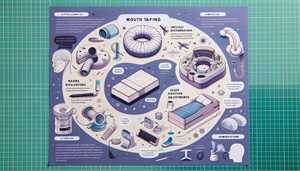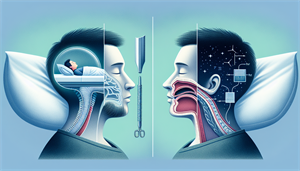
What Is an Alternative to Mouth Tape?
Picture yourself waking up in the morning with an uncomfortable dry mouth, bad breath, and an odd sense of fatigue. You’ve tried mouth taping to curb your nighttime mouth breathing, but it’s led to skin irritation and just doesn’t feel right. What if I told you that there are effective alternatives that can help you breathe easy and sleep better, without a piece of tape on your mouth? In this article, we will discuss “what is an alternative to mouth tape” to help you find a solution that works for you.
Key Takeaways
Mouth taping can cause safety concerns and there are better alternatives like changing sleep posture, using special pillows, mouthpieces, and improving overall sleep hygiene. If the source of your snoring is your nose, mouth taping can make it difficult to breathe at night and cause adverse effects. Professional help like consulting a sleep specialist and managing conditions like allergies or asthma can significantly help in improving breathing and sleep quality without mouth taping.
Understanding Mouth Breathing and Its Effects
Mouth breathing might seem like a harmless habit, but it can lead to a host of complications. When you breathe through your mouth instead of your nose, you’re not only more prone to dry mouth and bad breath, but it can also affect facial growth and lead to poor air quality. Understandably, many resort to mouth taping, a technique that promotes nasal breathing by closing the mouth. But hold up, is mouth taping safe? Well, imagine taping your mouth shut with a sticky piece of tape while you sleep. It can block your nose, reduce oxygen flow, potentially leading to heart issues or seizures, and cause skin irritation around the mouth. That doesn’t sound too appealing, does it?
It’s particularly risky for those with respiratory issues, allergies, asthma, or anatomical limitations such as a deviated septum or nasal polyps. This is why we need safer alternatives to mouth taping that can effectively curb mouth breathing. Thankfully, safer alternatives are available. They range from changing your sleeping posture to seeking advice from a sleep expert. These alternatives aim to improve your breathing and enhance sleep quality.
Switching Sleep Positions
Are you aware that your sleep position can have a significant impact on your breathing? One great way to reduce snoring and mouth breathing is by sleeping on your side. This position can help prevent airway blockage and promote better breathing during sleep. Sounds simple, right? But how do you ensure you maintain this position all night long?
Here, pillows play a significant role. By using a few well-placed pillows, you can train yourself to sleep on your side, which can encourage nose breathing and prevent you from rolling over. You might also want to consider investing in a new mattress and pillow. A comfortable bed can make side-sleeping more appealing and help you transition from less beneficial sleeping positions.
Using Pillows for Support
Using pillows for support isn’t just about comfort. It’s a strategy that can help you train your body to sleep on its side and reduce mouth breathing. But not just any pillow will do. If you’re a side sleeper or a mouth breather, consider getting pillows like the Saatva Latex Pillow, Eli & Elm Side Sleeper, or the Casper Hybrid Pillow. These pillows are designed to provide the right balance of support and comfort for side sleepers.
For optimal support, use a thicker and firmer pillow under your head. Adding a pillow between your knees can help keep your spine aligned and prevent joint discomfort. This setup not only enhances your comfort but also helps stop mouth breathing during sleep. Such pillows not only enhance comfort but also significantly improve sleep quality.

